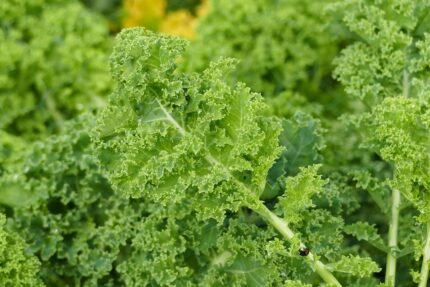Medically reviewed by Dr. Ramesh Gaddam, M.D. — Written by Sumalatha, D.N.H.E
Baby kale is a young, tender version of kale, harvested within 10-20 days of germination.
It has a milder flavor and softer texture than mature kale, with a slightly sweet and nutty taste.
Baby kale is rich in vitamins A, C, and K, as well as minerals like calcium and iron.
It’s a popular addition to salads, smoothies, and sautéed dishes, and can be used as a garnish or added to sandwiches and wraps for extra nutrition and flavor.

1. Baby Kale Nutrition
Nutritional profile of baby kale per 1 cup (20g) serving:
| Nutrient | Amount 1 cup (20g) serving | Daily Value (DV%) |
|---|---|---|
| Calories | 7 | 0.4% |
| Fat | 0.3g | 0.4% |
| Carbohydrates | 1.3g | 0.4% |
| Fiber | 0.8g | 3% |
| Protein | 0.6g | 1.2% |
| Vitamin A | 68.2mcg | 8% |
| Vitamin C | 17mg | 19% |
| Calcium | 35mg | 3% |
| Iron | 0.3mg | 2% |
| Potassium | 79mg | 2% |
| Vitamin K | 113mcg | 94% |
2. Health Benefits

Following are the Potential Health Benefits of Baby Kale.
1. Rich in Antioxidants
Baby Kale is a nutrient-dense superfood that packs a powerful punch when it comes to antioxidants.
Antioxidants are molecules that help neutralize free radicals, which are unstable compounds that can cause oxidative stress and damage to cells.
Baby Kale is an excellent source of:
- Vitamin A: A potent antioxidant that helps protect cells from damage and supports healthy vision, immune function, and skin health.
- Vitamin C: A water-soluble antioxidant that helps boost the immune system, fight off infections, and protect against cell damage.
- Vitamin K: A fat-soluble antioxidant that plays a crucial role in blood clotting, bone health, and cardiovascular health.
Flavonoids and Carotenoids in Baby Kale:
In addition to these vitamins, Baby Kale also contains a variety of flavonoids and carotenoids, including:
- Lutein and zeaxanthin, which have been shown to protect the eyes and reduce the risk of age-related macular degeneration.
- Kaempferol, a flavonoid that has been shown to have anti-inflammatory and anti-cancer properties.
- Quercetin, a flavonoid that has been shown to have anti-inflammatory and anti-allergic properties.
Health Benefits of Antioxidants in Baby Kale:
The high antioxidant content in Baby Kale makes it an excellent addition to a healthy diet, helping to:
- Protect cells from damage and oxidative stress
- Support immune function and reduce inflammation
- Promote healthy aging and reduce the risk of chronic diseases
Overall, the antioxidants in Baby Kale make it a nutrient-dense superfood that can provide a range of health benefits when consumed as part of a balanced diet.
2. Supports Eye Health

Baby Kale is a rich source of lutein and zeaxanthin, two carotenoids that are essential for eye health. These compounds have been shown to:
- Reduce the risk of age-related macular degeneration (AMD), a leading cause of vision loss in older adults.
- Protect the eyes against harmful blue light, which is emitted by digital devices and can contribute to eye strain and fatigue.
- Improve visual acuity and contrast sensitivity, making it easier to see objects clearly.
- Reduce the risk of cataracts, a clouding of the lens in the eye that can impair vision.
The high levels of lutein and zeaxanthin in baby kale make it an excellent food for supporting eye health and reducing the risk of age-related eye problems.
In fact, studies have shown that consuming foods rich in these carotenoids can:
- Reduce the risk of AMD by up to 40%
- Improve visual function in people with AMD
- Reduce eye fatigue and improve visual performance in people who spend a lot of time in front of digital screens
Overall, the lutein and zeaxanthin in baby kale make it a great addition to a healthy diet for anyone looking to support their eye health and reduce the risk of age-related eye problems.
3. Boosts Immune System

Baby Kale is a powerful immune-boosting food, thanks to its high content of vitamin C, beta-carotene, and other antioxidants.
These compounds work together to:
- Support the production of white blood cells, which are vital for fighting off infections.
- Enhance the body’s natural defense against pathogens, such as bacteria and viruses.
- Reduce inflammation, which can weaken the immune system and increase the risk of illness.
- Protect against oxidative stress, which can damage immune cells and impair immune function.
The immune-boosting effects of baby kale make it an excellent food for:
- Reducing the severity of colds and flu.
- Supporting recovery from illness.
- Protecting against infections, such as bronchitis, pneumonia, and sinusitis.
- Supporting healthy gut bacteria, which is essential for a strong immune system.
In addition, the antioxidants in baby kale may also help to:
- Reduce the risk of chronic diseases, such as heart disease, cancer, and neurodegenerative disorders.
- Support healthy aging by reducing oxidative stress and inflammation.
Overall, the immune-boosting effects of baby kale make it a great addition to a healthy diet, helping to keep your immune system strong and resilient.
4. Anti-Inflammatory Effects

5. Supports Bone Health

Baby Kale is a rich source of calcium, vitamin K, and other nutrients essential for maintaining strong bones. These nutrients work together to:
- Support bone density, reducing the risk of osteoporosis and fractures.
- Promote calcium absorption, ensuring that bones receive the nutrients they need.
- Activate osteocalcin, a protein that helps build new bone tissue.
- Regulate bone metabolism, ensuring that bones are strong and healthy.
The bone-supporting effects of baby kale may help to:
- Reduce the risk of osteoporosis, a condition characterized by brittle and fragile bones.
- Improve bone density, reducing the risk of fractures.
- Support healthy teeth and gums by promoting calcium absorption and bone health.
- Reduce the risk of rheumatoid arthritis by promoting healthy bone metabolism.
In addition, the vitamin K in baby kale may also help to:
- Activate osteocalcin, a protein that helps build new bone tissue.
- Regulate calcium metabolism, ensuring that bones receive the nutrients they need.
Overall, the bone-supporting effects of baby kale make it a great addition to a healthy diet, helping to maintain strong bones and reduce the risk of osteoporosis and fractures.
6. May Reduce Cancer Risk

Baby Kale contains a wealth of antioxidants, vitamins, and other nutrients that have been shown to have anti-cancer properties. These compounds may help to:
- Reduce the risk of colon, breast, and prostate cancers.
- Inhibit the growth of cancer cells.
- Induce apoptosis (cell death) in cancer cells.
- Protect against DNA damage and mutations.
The anti-cancer effects of baby kale may be attributed to its high content of:
- Isothiocyanates: Compounds that have been shown to have anti-cancer properties.
- Vitamin C: Helps to protect against DNA damage and mutations.
- Vitamin K: May help to inhibit the growth of cancer cells.
- Fiber: May help to reduce the risk of colon cancer.
While more research is needed to fully understand the anti-cancer effects of baby kale, adding it to your diet may help to:
- Reduce the risk of chronic diseases, such as cancer and heart disease.
- Support overall health and well-being.
- Provide antioxidant and anti-inflammatory effects.
Note: Baby kale is not a substitute for medical treatment or advice. If you have any concerns about cancer or other health issues, please consult a healthcare professional.
7. Supports Cardiovascular Health

Baby Kale is a nutrient-dense food that supports heart health by:
- Lowering cholesterol levels: The fiber and antioxidants in baby kale may help reduce LDL (bad) cholesterol.
- Reducing blood pressure: Regular consumption of baby kale may help lower blood pressure in people with hypertension.
- Preventing blood clots: Vitamin K in baby kale helps prevent blood clots, reducing the risk of heart attack and stroke.
- Improving blood lipid profiles: Baby kale’s antioxidants and fiber may help increase HDL (good) cholesterol and reduce triglycerides.
The cardiovascular benefits of baby kale may also help:
- Reduce the risk of heart disease, stroke, and cardiac arrhythmias.
- Improve overall cardiovascular function.
- Support healthy blood vessels and circulation.
Incorporating baby kale into your diet can provide these cardiovascular benefits, making it a great addition to a heart-healthy lifestyle.
8. Aids in Detoxification

Baby Kale is a powerful detoxifier that supports the body’s natural processes to:
- Remove toxins and heavy metals: The antioxidants and fiber in baby kale help bind to toxins, aiding in their elimination.
- Support liver function: Vitamins and antioxidants in baby kale assist the liver in processing and removing toxins.
- Promote kidney health: Antioxidants and fiber in baby kale support kidney function, aiding in the removal of waste and toxins.
- Alkalize the body: Baby kale’s high pH level helps counterbalance acidity, supporting the body’s natural detox processes.
Incorporating baby kale into your diet may help you:
- Enhance your body’s natural detoxification processes.
- Reduce the risk of chronic diseases linked to toxin buildup.
- Support overall health and well-being.
- Feel more energized and revitalized.
Remember, baby kale is a nutrient-dense food that supports overall health. Enjoy it as part of a balanced diet!
9. Supports Healthy Digestion

Baby Kale is a rich source of fiber, vitamins, and minerals that support healthy digestion, promoting:
- Regular bowel movements: Fiber in baby kale helps regulate bowel movements and prevent constipation.
- Healthy gut bacteria: Prebiotic fiber in baby kale feeds good bacteria, supporting a balanced gut microbiome.
- Proper nutrient absorption: Baby kale’s fiber and antioxidants help ensure optimal nutrient absorption.
- Reduced symptoms of IBS: Baby kale’s soothing properties may alleviate symptoms of irritable bowel syndrome.
Incorporating baby kale into your diet may help you:
- Experience improved digestive comfort.
- Support a healthy gut-brain axis.
- Boost your immune system.
- Enjoy a reduced risk of chronic diseases linked to poor digestion.
Remember, a healthy gut is essential for overall well-being! Enjoy baby kale as part of a balanced diet to support your digestive health.
10. May Improve Cognitive Function

Baby Kale contains a wealth of antioxidants, vitamins, and minerals that support brain health, potentially improving:
- Memory and concentration: Antioxidants in baby kale may help reduce oxidative stress, improving cognitive function.
- Mood and mental clarity: Omega-3 fatty acids and antioxidants in baby kale may support healthy neurotransmitter function, enhancing mood and mental clarity.
- Focus and productivity: Vitamins and minerals in baby kale may help regulate blood flow to the brain, enhancing focus and productivity.
- Neuroprotection: Antioxidants in baby kale may help protect against age-related cognitive decline and neurodegenerative diseases.
Incorporating baby kale into your diet may help you:
- Enhance your mental performance.
- Support overall brain health.
- Reduce the risk of age-related cognitive decline.
- Enjoy an improved sense of well-being and focus.
Remember, a healthy brain is essential for a happy and productive life! Enjoy baby kale as part of a balanced diet to support your brain health.
11. Baby Kale Benefits for Weight Loss
Baby kale offers several benefits that can support weight loss:
1. Low in Calories:
Baby kale is very low in calories, making it an excellent addition to weight loss diets.
2. High in Fiber:
Baby kale is rich in fiber, which helps keep you full and satisfied, reducing cravings for unhealthy snacks.
3. Rich in Vitamins and Minerals:
Baby kale is packed with vitamins A, C, and K, and minerals like calcium and iron, which support overall health and well-being.
4. Antioxidant Properties:
Baby kale contains antioxidants that help reduce inflammation and promote healthy metabolism.
5. Supports Healthy Digestion:
Baby kale is high in fiber, which supports healthy digestion and promotes regular bowel movements.
6. May Help Reduce Inflammation:
Baby kale contains antioxidants and other compounds that may help reduce inflammation, which is associated with obesity and metabolic disease.
7. Supports Healthy Blood Sugar Levels:
Baby kale contains fiber and other compounds that may help regulate blood sugar levels.
8. May Help Reduce Cravings:
Baby kale is low in calories and high in fiber, making it a filling and satisfying addition to meals and snacks.
Weight loss ultimately comes down to a calorie deficit, but incorporating nutrient-dense foods like baby kale can support a healthy weight loss journey.
12. Baby Kale Benefits for Men
Baby kale offers numerous benefits for men, including:
Prostate Health
Baby kale contains compounds that may help reduce the risk of prostate cancer and support healthy prostate function.
Testosterone Support
Baby kale is rich in vitamins and minerals that support testosterone production and overall hormonal balance.
Energy and Endurance
Baby kale is packed with iron, which helps reduce fatigue and increase energy levels.
Heart Health
Baby kale’s antioxidants and fiber support heart health, reducing the risk of cardiovascular disease.
Anti-Inflammatory Effects
Baby kale’s antioxidants may help reduce inflammation, which can reduce the risk of chronic diseases.
Immune System Support
Baby kale is rich in vitamin C, which supports immune function and overall health.
Healthy Bones
Baby kale is a good source of calcium, which supports bone health and reduces the risk of osteoporosis.
Anti-Aging Benefits
Baby kale’s antioxidants may help reduce the signs of aging, such as wrinkles and age spots.
Supports Healthy Libido
Baby kale’s vitamin and mineral content supports hormonal balance, which can help maintain a healthy libido.
Supports Healthy Hair and Skin
Baby kale’s antioxidants and vitamins may help promote healthy hair and skin.
A balanced diet and healthy lifestyle are essential for overall well-being. Baby kale can be a great addition to a healthy diet, but it should not be relied upon as the sole means of support for any specific health benefit.
Frequently Asked Questions (FAQs)
People searched frequently on FAQs related to Baby Kale Health Benefits:
What is baby kale?
Baby kale is a young, tender version of the kale plant, harvested before it reaches maturity.
Is baby kale as healthy as regular kale?
Baby kale is as healthy as regular kale, with a more delicate flavor and texture. It’s like getting all the benefits of kale, but in a more palatable package!
Is baby kale better than spinach?
Baby kale and spinach are both nutritional rockstars, but they have different strengths. Baby kale is like a vitamin and mineral powerhouse, while spinach is a fiber and protein superstar. It’s like they’re both winners, but in different ways!
Is baby kale a superfood?
Baby kale is indeed a superfood, meaning it’s packed with an impressive amount of nutrients and antioxidants that can supercharge your health. It’s like a tiny, tasty superhero for your body!
What are the health benefits of baby kale?
Baby kale is rich in vitamins, minerals, and antioxidants, and may support heart health, prostate health, energy and endurance, immune function, and healthy digestion.
Is baby kale high in calories?
No, baby kale is very low in calories, making it an excellent addition to weight loss diets.
Can baby kale support eye health?
Yes, baby kale is rich in lutein and zeaxanthin, which may reduce the risk of age-related macular degeneration.
Is baby kale a good source of fiber?
Yes, baby kale is high in fiber, which supports healthy digestion, satiety, and blood sugar control.
Can baby kale support bone health?
Yes, baby kale is a good source of calcium, which supports bone health and reduces the risk of osteoporosis.
Is baby kale safe to eat raw?
Yes, baby kale is safe to eat raw and can be added to salads, smoothies, and other dishes.
How do I incorporate baby kale into my diet?
Baby kale can be used in salads, sautéed as a side dish, added to smoothies, or used as a garnish for soups and other dishes.
Is baby kale expensive?
No, baby kale is generally priced similarly to other leafy greens and is an affordable addition to a healthy diet.
Can I grow my own baby kale?
Yes, baby kale is easy to grow and can be harvested in as little as 20 days.
Also Read:
8 Health Benefits of Malabar Spinach (Eyes, Anemia & More)
Mediterranean Diet Plan – Core Principles, 9 Health Benefits
Medically reviewed by Dr. Ramesh Gaddam, M.D.

General Physician, Diabetologist, and Critical Care Specialist.
Discover more from Health Build-Up
Subscribe to get the latest posts sent to your email.
